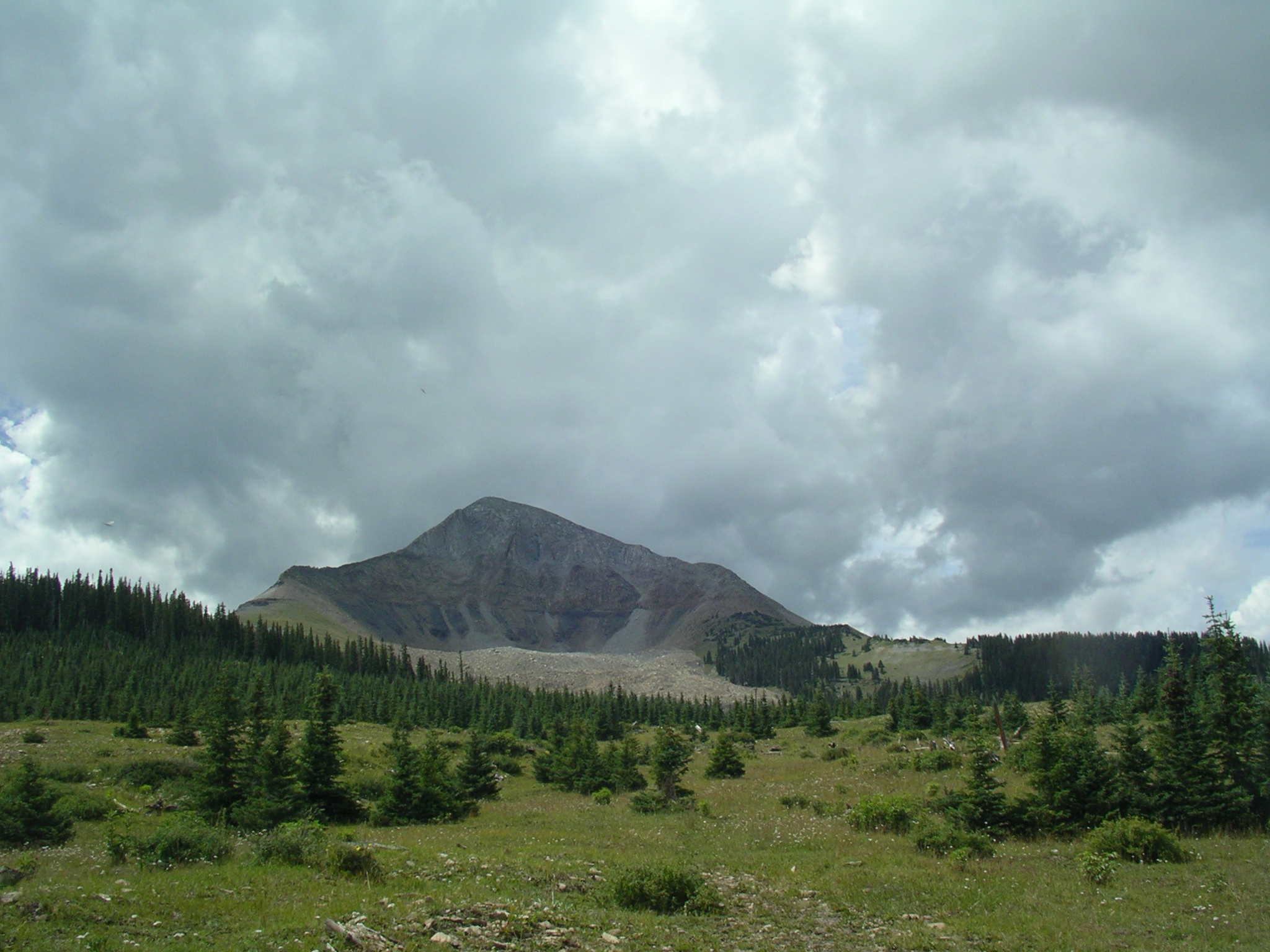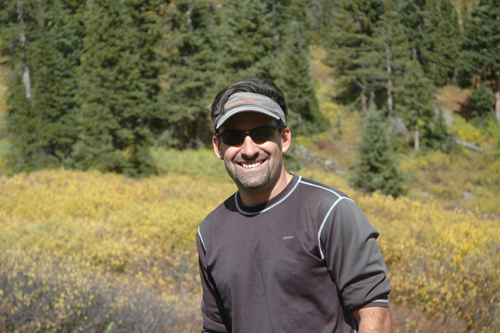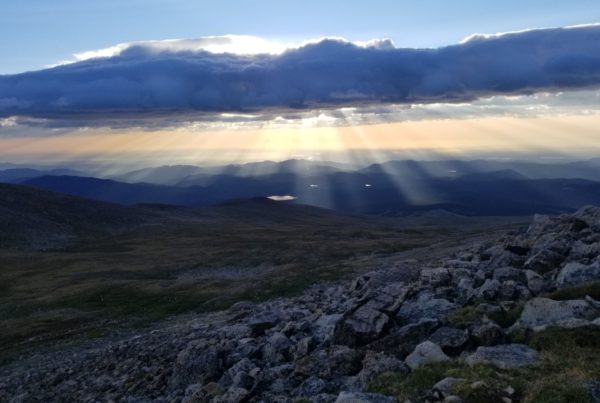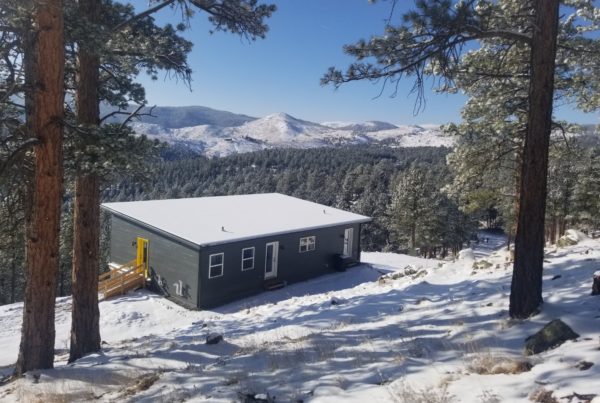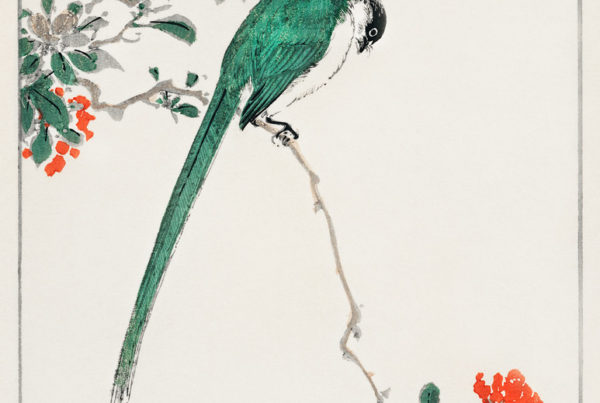Last Updated on November 19, 2014 by James Dziezynski
Lone Cone is an obscure, 12,618 ft. mountain in the remote southwest corner of Colorado. Its crumbling facade rises from the earth where forests begin their subtle transformation into desert. From Lone Cone’s summit, one can witness tracts of farmland dehydrating into brown and yellow scrubland to the west, a lonely expanse where snow-streaked mountains bookend the horizon. Its suggestive nomenclature has contributed to a sense of raw loneliness I have unexpectedly felt on the mountain.
Or maybe it’s the words in the battered journal.
Because so few people visit Lone Cone, the summit journal archives a longer period of time than more popular peaks. When I first visited the mountain in 2006, the ratty but intact notebook was protected by a glass jar. The crisp pages felt as flimsy as withered autumn leaves and the entries only spanned the first six or seven pages. The oldest was dated 1986 and most were nothing more than signatures with a brief comment: “Great views!” “Saw two mountain goats” “Thank Jesus and God for mountains”.
However, mixed within those ephemeral declarations of awe were three distinct entries, written is a hasty but tidy script. I saw them dated 2002, 2005 and 2006. All three were written and initialed in nearly identical text. Rarely do I sit down and really absorb the missives of summit journals, but something about these interconnected posts got my attention.
“I keep thinking it’s good to be here, [I] keep telling myself that,” the 2006 entry begins. “But don’t feel it. I haven’t felt anything since I stopped drinking. I want this mountain to move me, but it doesn’t. I feel nothing. But I will be back and I hope that will be the day those words find me a better man.”
To condense the story, the three entries chronicle the struggle of a stranger, a man whose sorrow radiates in every line and whose sentiment is amplified by the isolated setting. I don’t know who wrote them. The melancholy summary is this: man hits rock bottom, cleans up, goes numb. There are scant details of a neglected child, a woman long gone and a repeated plea for understanding, meaning or purpose. There is a masterful innocence in these simple words and a palpable desperation that begs for some happy, redemptive conclusion.
*****
Suicide remains one of the great philosophical complexities in my own mind. As a young man, I found the notion terrifying and absurd. I could not imagine any set of circumstances that would justify self-extinguishment, nor could I fathom the impetus to commit the actual act. Falls from great heights, swinging from a noose, slowly bleeding out… they all seemed so blatantly horrible. I shuddered at the mere notion of sober thought during the act, a fearful flicker of rationale whose obliteration was as inevitable as the flesh and bone from which it was generated.
I’m 38. The bravado and naivety of my younger self no longer assigns suicide as a rare event of the lunatic fringe. I have lost several friends — some quite close — to suicide. Extending one degree further, nearly every person I know has also experienced the loss of loved ones to suicide. My friends that have gone were not unstable, unreliable or untalented. They were smart, deep and complex. Decent men and women to the end, all of whom found that internal switch that brings the mind and heart to a place most of us are forbidden to consider.
I do not judge them for their decisions, though their absences leave me in a cloudy, gloomy place. There have been moments in my own life of panic and disorder — loss of jobs, financial troubles, dark ruminations — but I have never as so much approached the cliff, let alone peered into that murky abyss and saw absolution. I am at a loss at the weight and pain that must make the prospect of suicide a tangible flicker that is nurtured into the ultimate act of self destruction. That my friends have had to shoulder that burden make me sympathetic, though that in itself does not endorse their decision.
Like many logical people, I see value and dignity in euthanasia, especially in cases of prolonged suffering and terminal diagnoses. It is the ultimate act of kindness for many of our pets, one that breaks our hearts despite honorable intentions. It is so much easier to justify the act when the pain and suffering is visible, whether in the form of limited physical capacity or the dull, empty eyes of a deteriorating mind. Judgement is much more emphatically dealt when the person is young, healthy, part of a strong family. There are those who call suicide selfish, those who view it as the ultimate insult to some divine creator, those who consider the person weak-minded and cowardly. I do not subscribe to any of those assessments.
As an avid mountain hiker, I have a saying, “If you’re not having fun, it’s time to go home.” I say that with the knowledge there is always a certain amount of trouble and suffering mountain climbing entails and that is unavoidable. But I have had days where despite feeling strong with good weather and well-equipped, I wasn’t happy. It’s rare, but it happens. And then it’s time to go home and try again another day. It is a mini-defeat that offers the chance at some future victory. It — unlike suicide — is a temporary retreat.
For my friends and the many thousands that commit suicide every year, I cannot speak to their personal levels of fulfillment in this life. The despair that fuels suicide is a strictly personal dialogue. Mental illness, crisis, betrayal are all focused in the mind of the individual in ways that are unique to each of us. Even the most attentive partners, friends and family may be powerless to dispel the allure of escape that suicide provides. While my thoughts on suicide are much more informed and sophisticated from when I was a teenager, the complexity and reality of the act itself remains an abstract and terrifying notion.
Life is hard. We are needlessly hard on one another. We are hard on the earth. We are a relentlessly uncertain species whose thirst for meaning recedes in many different directions. I miss my friends and the potential they brought to our overlapping worlds. I shall remember them for the beauty, laughter, insight and color they brought to my life. I hope the have found the detachment and peace that eluded them in their lives.
For those of us among the living, I say this: be good to one another. Really good.
I am no more exempt from the self-doubt and struggle than anyone else. I’d like to think there’s a safety net of some sort, built from the strands of love and friendship that keep me from inching nearer to that fearful precipice. Like all of us I crave purpose and meaning in my days — in my own little way, I hope the world I share with all of you serves as a small bit of inspiration, that there are amazing emotions to experience and incredible places to explore.
Most of all, remember that we are not always proficient at diagnosing the desperation of others. If you are worried about a friend, talk to them (there are some common warning signs to look out for). Pay attention and help if you can. Troubled souls do not always cry out.
And I really mean it… be good to one another. Kindness is something in such short supply these days. Do your best to listen to your friends and to your own voice. As the cliche goes, everyone is fighting a battle of some sort. And for those who cannot be reached, those who have already gone… I find it best to honor them for the stories of their lives rather than the circumstances of their deaths.

